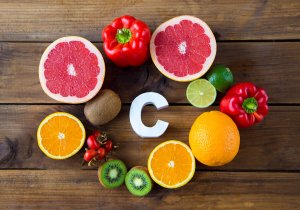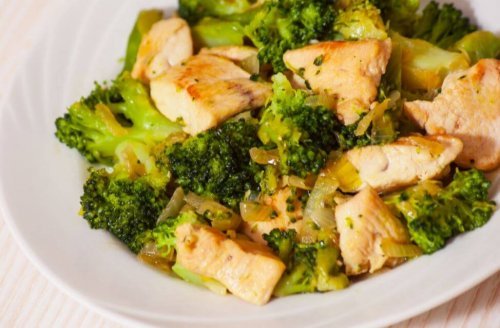Properties and Benefits of Vitamin C

Did you know that human beings are one of the few living beings unable to produce vitamin C? It’s a very curious fact, more so, considering that this vitamin is essential for the proper functioning of the body. In order for you to know more about this micronutrient, we’ll analyze the properties and benefits of vitamin C.
What’s more, at the end of this article, we’ll point out some of the foods that contain vitamin C. You’ll probably be surprised with more than one because you didn’t know it contained this micronutrient.
Properties and benefits of vitamin C
We could spend hours and hours talking about the benefits of vitamin C. It has a very positive influence and affects so many aspects of our health that it’s hard to just make a brief summary. That’s why we’ll concentrate on the most important properties that enable us to live healthily. Keep reading to discover which ones we’re referring to.
Properties and benefits of vitamin C: delays the aging of our skin
If you take a look at the beauty section of the store you frequent, you’ll notice that many products contain vitamin C. This is because this vitamin has a direct impact on our elasticity and, therefore, prevents dreaded wrinkles from appearing.
Vitamin C is widely used in the manufacture of creams because it’s involved in the formation of collagen. This protein provides elasticity and firmness to our skin.

Contributes to the development of the osseous system
When we think about improving our bone health, especially in children or the elderly, surely the first thing that comes to mind is calcium. However, many more nutrients are present in this process and one of them is vitamin C.
Consuming vitamin C on a regular basis decreases the risk of bone fractures and loss of bone mass. That’s why everyone must ingest this vitamin; we all want to have a strong and resistant osseous system.
Properties and benefits of vitamin C: increases fertility
Yes, just as you’ve read: vitamin C increases fertility because it helps create high-quality sperm. Foods rich in this nutrient are especially effective in men who have problems of this nature.
Nonetheless, this would only be the first step in mild or preventive cases. If fertility becomes a problem, it’s best to put yourself in the hands of a doctor.
Reduces levels of stress and anxiety
Vitamin C is closely related to our mood. This micronutrient acts as an inhibitor in the production of cortisol, thus, preventing the occurrence of stress and anxiety episodes.
Regularly eating foods that are rich in this vitamin will help stabilize your emotional health and keep you from suffering nervous breakdowns.
If you’re going through a stage of stress and anxiety due to studies, work, or family problems, you should know that vitamin C is a perfectly natural complement to help stay calm.
Foods rich in vitamin C
Now that you know the properties and benefits of vitamin C, you’re probably interested in knowing which foods contain it? You’re in luck since we can find it in a wide variety of products and, best of all, besides being rich in vitamin C, they’re very healthy as well.
Take a look at the list below and discover the many foods that are rich in vitamin C besides oranges. In fact, there are other foods that contain a higher percentage of this vitamin.
- Kiwi: contains 100 milligrams of vitamin C per 100 grams.
- Red pepper: it holds 139 milligrams of vitamin C per 100 grams.
- Broccoli: it has 110 milligrams of vitamin C per 100 grams.

- Grapes: contain 90 milligrams of vitamin C per 100 grams.
- Strawberries: they have 70 milligrams of vitamin C per 100 grams.
- Fennel: it has 93 milligrams of vitamin C per 100 grams.
As you can see, all of these foods are easy to find and are very versatile in the kitchen. Incorporate them into your daily dishes to take care of your health!
Did you know that human beings are one of the few living beings unable to produce vitamin C? It’s a very curious fact, more so, considering that this vitamin is essential for the proper functioning of the body. In order for you to know more about this micronutrient, we’ll analyze the properties and benefits of vitamin C.
What’s more, at the end of this article, we’ll point out some of the foods that contain vitamin C. You’ll probably be surprised with more than one because you didn’t know it contained this micronutrient.
Properties and benefits of vitamin C
We could spend hours and hours talking about the benefits of vitamin C. It has a very positive influence and affects so many aspects of our health that it’s hard to just make a brief summary. That’s why we’ll concentrate on the most important properties that enable us to live healthily. Keep reading to discover which ones we’re referring to.
Properties and benefits of vitamin C: delays the aging of our skin
If you take a look at the beauty section of the store you frequent, you’ll notice that many products contain vitamin C. This is because this vitamin has a direct impact on our elasticity and, therefore, prevents dreaded wrinkles from appearing.
Vitamin C is widely used in the manufacture of creams because it’s involved in the formation of collagen. This protein provides elasticity and firmness to our skin.

Contributes to the development of the osseous system
When we think about improving our bone health, especially in children or the elderly, surely the first thing that comes to mind is calcium. However, many more nutrients are present in this process and one of them is vitamin C.
Consuming vitamin C on a regular basis decreases the risk of bone fractures and loss of bone mass. That’s why everyone must ingest this vitamin; we all want to have a strong and resistant osseous system.
Properties and benefits of vitamin C: increases fertility
Yes, just as you’ve read: vitamin C increases fertility because it helps create high-quality sperm. Foods rich in this nutrient are especially effective in men who have problems of this nature.
Nonetheless, this would only be the first step in mild or preventive cases. If fertility becomes a problem, it’s best to put yourself in the hands of a doctor.
Reduces levels of stress and anxiety
Vitamin C is closely related to our mood. This micronutrient acts as an inhibitor in the production of cortisol, thus, preventing the occurrence of stress and anxiety episodes.
Regularly eating foods that are rich in this vitamin will help stabilize your emotional health and keep you from suffering nervous breakdowns.
If you’re going through a stage of stress and anxiety due to studies, work, or family problems, you should know that vitamin C is a perfectly natural complement to help stay calm.
Foods rich in vitamin C
Now that you know the properties and benefits of vitamin C, you’re probably interested in knowing which foods contain it? You’re in luck since we can find it in a wide variety of products and, best of all, besides being rich in vitamin C, they’re very healthy as well.
Take a look at the list below and discover the many foods that are rich in vitamin C besides oranges. In fact, there are other foods that contain a higher percentage of this vitamin.
- Kiwi: contains 100 milligrams of vitamin C per 100 grams.
- Red pepper: it holds 139 milligrams of vitamin C per 100 grams.
- Broccoli: it has 110 milligrams of vitamin C per 100 grams.

- Grapes: contain 90 milligrams of vitamin C per 100 grams.
- Strawberries: they have 70 milligrams of vitamin C per 100 grams.
- Fennel: it has 93 milligrams of vitamin C per 100 grams.
As you can see, all of these foods are easy to find and are very versatile in the kitchen. Incorporate them into your daily dishes to take care of your health!
All cited sources were thoroughly reviewed by our team to ensure their quality, reliability, currency, and validity. The bibliography of this article was considered reliable and of academic or scientific accuracy.
- Ramírez-Tortosa, M. del C., & Quiles-Morales, J. L. (2010). Vitamina C, vitamina E y otros antioxidantes de origen alimentario. Tratado de Nutrición (Tomo I. Bases Fisiológicas y Bioquímicas de La Nutrición). https://doi.org/10.1111/resp.12324
This text is provided for informational purposes only and does not replace consultation with a professional. If in doubt, consult your specialist.








